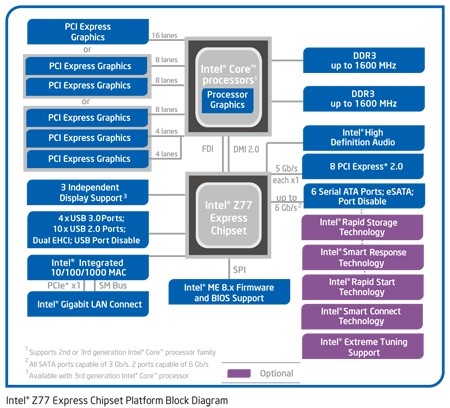Intel this week officially released the 7-series chipset family that will go along their third generation Core microarchitecture processors, known as Ivy Bridge, for notebooks and desktops products. Although the actual launch of Ivy Bridge processors is still a little over two weeks away, desktop motherboards based around Intel's Z77, Z75 and H77 chipsets are already being made available to those planning a future upgrade.
There won't be any physical changes to the existing LGA 1155 socket, so Sandy Bridge processors will still work in Series 7 motherboards if users want to upgrade the board now and the processor later. Conversely, a number of Intel 6-series chipsets (P67, Z68) should be forwards compatible with Ivy Bridge processors pending a BIOS update, if you are planning on upgrading the other way around.

The new chipsets – codenamed Panther Point – are part of Intel's first batch of mainstream and performance offerings for the desktop and will join the HM75, HM76, and HM77 on the mobile side of things. Among the new features Intel is touting are native support for USB 3.0 – which is widely supported on Sandy Bridge based systems but through third-party solutions from NEC and others – as well as new 'responsiveness technologies' like Intel Smart Response (SSD caching), Intel Smart Connect, and Intel Rapid Start.
Other new features include support for a couple of SATA III (6Gbps) ports in addition to up to four utilizing the older SATA II (3Gbps) interface, and support for 16 PCIe 3.0 lanes to be used for graphics and/or other add-in PCI cards – provided an Ivy Bridge processor that supports the newer standard is installed.
Overclocking is supported on Z-chipsets but not the H-chipset, and both support Intel's HD Graphics, unlike with Sandy Bridge where P67 boards didn't.
Intel is expected to launch Ivy Bridge on April 29, which will reportedly include several Core i5 and i7 chips for desktops and three i7 processors for notebooks. Furthermore, dual-core mobile CPUs are expected in the first week of June in addition to several more quad-core desktop parts. Early reports show a lack of low-voltage parts which suggests we might not see Ivy Bridge Ultrabooks until later this spring.